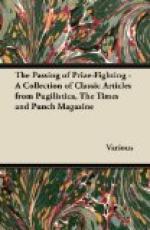There are some fifty thousand British soldiers in Ireland, costing over a million pounds a month. But Mr. CHURCHILL took the cheery view that after all they had to be somewhere, and would cost nearly as much even in Great Britain.
They would cost a good deal more in Mesopotamia, where we have a hundred thousand troops (British and Indian), and the cost is two and a half millions a month. Sir WILLIAM JOYNSON-HICKS could not understand why we should spend all this money “merely to hand the country back to the rebels.” Mr. CHURCHILL said he had heard nothing about handing the country back to the rebels; from which it may be inferred either that he is not admitted into all the secrets of the Cabinet or that he draws a distinction between “rebels” and “persons who object to British rule.”
The Press campaign in favour of a nickel three-halfpenny coin has not succeeded. In Mr. CHAMBERLAIN’S opinion it would not be a coin of vantage. Among his objections to it may be the extreme probability that the present Administration would promptly be nicknamed (I will not say nickel-named) “the Three-half-penny Government.”
Owing to a number of concessions announced by the HOME SECRETARY the Emergency Powers Bill had a fairly smooth passage through Committee. Objections were still raised to making an Emergency Act permanent—it does sound rather like a contradiction in terms—but the ATTORNEY-GENERAL skilfully countered them by pointing out that it was only the framework of the machinery, not the regulations, that would be permanent. One can imagine the bold bad baron who set up a gallows to overawe his villeins comforting objectors with the remark that after all it was merely a framework—quite useless without a rope.
[Illustration: THE BOLD BAD BARON.
Sir Gordon Hewart. “MERELY A FRAMEWORK—QUITE USELESS WITHOUT A ROPE.”]
Wednesday, October 27th.—Much pother in the Lords because the FIRST COMMISSIONER OF WORKS had set up a Committee to advise him with regard to the preservation of ancient monuments, including cathedrals and churches, without first consulting the ecclesiastical authorities. Lord PARMOOR moved a condemnatory resolution, and His Grace of CANTERBURY, after renouncing Sir ALFRED MOND and all his works, declared that, so far as religious edifices were concerned, the proposed Committee was a superfluity of naughtiness with which he personally would have nothing to do. Lord LYTTON, with that delightful free-and-easiness which characterises the attitude of our present Ministers towards their colleagues, observed that he could have sympathised with the objectors if it were really intended to place cathedrals under Sir ALFRED’S care; but it wasn’t;—so why all this fuss? Lord CRAWFORD, while sharing the Opposition’s dislike of restorers, from VIOLLET-LE-DUC to the late Lord GRIMTHORPE, could not admit that in this matter the Office of Works had been guilty of anything worse than a want of tact. Lord PARMOOR insisted on going to a division, and carried his motion by 27 to 17. Despite this shattering blow the Government is said to be going on as well as can be expected.




